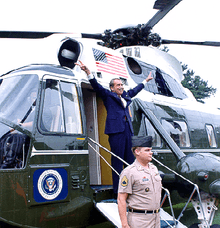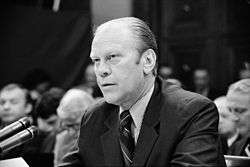1974 in the United States
| 1974 in the United States | |
|---|---|
| Years: | 1971 1972 1973 – 1974 – 1975 1976 1977 |
|
| |
 50 stars (1960–present) | |
|
Timeline of United States history
| |
This list is incomplete; you can help by expanding it.
Events from the year 1974 in the United States.
Incumbents
Federal Government
- President: Richard Nixon (R-California) (until August 9), Gerald Ford (R-Michigan) (starting August 9)
- Vice President:
- until August 9: Gerald Ford (R-Michigan)
- August 9–December 19: vacant
- starting December 19: Nelson Rockefeller (R-New York)
- Chief Justice: Warren E. Burger (Minnesota)
- Speaker of the House of Representatives: Carl Albert (D-Oklahoma)
- Senate Majority Leader: Mike Mansfield (D-Montana)
- Congress: 93rd
Events
January
- January 4
- Citing executive privilege, President Richard Nixon refuses to surrender 500 tapes and documents which have been subpoenaed by the Senate Watergate Committee.
- Joni Lenz is attacked in her bedroom by serial killer Ted Bundy in Washington.
- January 6 – In response to the energy crisis, Daylight Saving Time commences nearly 4 months early in the United States.
- January 19 – In college (men's) basketball, Notre Dame defeats UCLA 71–70, ending the Bruins' record 88-game winning streak.
- January 30
- G. Gordon Liddy is found guilty of Watergate charges.
- In his State of the Union Address, President Nixon declares, "One year of Watergate is enough."
February
- February 4 - Newspaper heiress Patricia Hearst is kidnapped from her Berkeley, California apartment by members of the Symbionese Liberation Army.[1]
- February 8 – After a record 84 days in orbit, the crew of Skylab 4 returns to Earth.
- February 12 – U.S. District Court Judge Geoerge Boldt rules that Native American tribes in Washington State are entitled to half of the legal salmon and steelhead catches, based on treaties signed by the tribes and the U.S. government.
- February 22 – Samuel Byck attempts to hijack an airplane with the intent to crash it into the White House and assassinate President Nixon. He commits suicide when police stormed the plane.
March
- March 1 – Watergate scandal: Seven former White House officials are indicted for their role in the Watergate break-in and charged with conspiracy to obstruct justice.
- March 18 – Oil embargo crisis: Most OPEC nations end a 5-month oil embargo against the United States, Europe and Japan.
- March 29 – Mariner 10 approaches Mercury.
April
- April 3 – The 1974 Super Outbreak, the second-largest series of tornadoes in history, hits 13 U.S. states and one Canadian province. By the time the last of 148 tornadoes hit early the following morning, 315 die and over 5,000 are injured.
- April 8 – Hank Aaron of the Atlanta Braves breaks Babe Ruth's home run record, by hitting his 715th career home run off Los Angeles Dodgers pitcher Al Downing at Atlanta-Fulton County Stadium.
- April 15 – In San Francisco, members of the Symbionese Liberation Army rob a branch of the Hibernia Bank, joined by Patricia Hearst, their erstwhile captive.
- April 22 – Hi-Fi Murders: 5 people are brutally tortured by a group of men during a robbery at home audio store in Ogden, Utah, resulting in 3 deaths.
May
- May 4 – The Expo '74 World's Fair opens in Spokane, Washington.
- May 9 – The House of Representatives Judiciary Committee opens formal and public impeachment hearings against President Richard Nixon.
- May 17 – Los Angeles police raid Symbionese Liberation Army headquarters, killing 6 members, including Camilla Hall.
- May 19 – The Philadelphia Flyers defeat the Boston Bruins, thereby becoming the first expansion team to win the Stanley Cup.
- May 30 – NASA's ATS-6 satellite is launched.
June
- June 4 – The Cleveland Indians stage an ill-advised Ten Cent Beer Night for a game against the Texas Rangers at Cleveland Municipal Stadium. Cleveland forfeits after alcohol-fueled mayhem and violence spreads from the stands onto the field.
- June 26 – The Universal Product Code is scanned for the first time, to sell a package of Wrigley's chewing gum at the Marsh Supermarket in Troy, Ohio.
- June 30 – Alberta Williams King, mother of the late Martin Luther King, Jr., is killed during a church service in Atlanta, Georgia.
July
- July 14 – In Issaquah, Washington, serial killer Ted Bundy abducts Janice Ott and Denise Naslund in broad daylight at Lake Sammamish State Park.
- July 15 – Christine Chubbuck, television presenter for WXLT-TV Sarasota, Florida, draws a revolver and shoots herself in the head during a live broadcast. She dies in a hospital 14 hours later.
- July 24 – Watergate scandal – United States v. Nixon: The Supreme Court unanimously rules that President Richard Nixon cannot withhold subpoenaed White House tapes, and orders him to surrender them to the Watergate special prosecutor.
- July 27–30 – Watergate scandal: The House of Representatives Judiciary Committee adopts 3 articles of impeachment, charging President Nixon with obstruction of justice, failure to uphold laws, and refusal to produce material subpoenaed by the committee.
August

August 9: Richard Nixon resigns as President of the United States

August 9: President Gerald Ford is sworn in
Nixon Oval Office meeting with H.R. Haldeman "Smoking Gun" Conversation June 23, 1972 Full Transcript
- August 5 – Watergate scandal: The "smoking gun" tape of June 23, 1972, is revealed, in which President Richard Nixon and White House Chief of Staff H.R. Haldeman discuss using the Central Intelligence Agency to block a Federal Bureau of Investigation inquiry into Watergate. Nixon's support in Congress collapses.
- August 7
- Three Republican congressional leaders (Barry Goldwater, Hugh Scott and John Rhodes) visit President Nixon in the White House. They inform him that he lacks the votes to escape impeachment in the House of Representatives and conviction in the Senate.
- French acrobat Philippe Petit walks across a high wire slung between the twin towers of the World Trade Center in New York.
- August 8 – Watergate scandal: President Nixon announces his resignation (effective August 9).[2]
- August 9 – Richard Nixon becomes the first President of the United States to resign from office, an action taken to avoid being removed by impeachment and conviction in response to his role in the Watergate scandal. Vice President Gerald R. Ford becomes the 38th President upon Nixon's resignation, taking the oath of office in the East Room of the White House.
- August 30 – Public Law 93-400 is enacted, establishing the Office of Federal Procurement Policy (see Federal Acquisition Regulation).
September
- September 1 – Daredevil Bob Gill fails a world-record attempt to jump Appalachia Lake in West Virginia.
- September 8
- Watergate scandal: U.S. President Gerald Ford pardons former President Richard Nixon for any crimes Nixon may have committed while in office.[2]
- Stuntman Evel Knievel fails in his attempt to rocket across the Snake River Canyon in Idaho.
- September 16 – In Newport, Rhode Island, America's Cup defender "Courageous", skippered by Ted Hood, wins over Australian challenger "Southern Cross".
October

October 17: President Ford testifies before the House Judiciary Subcommittee regarding his pardon of Nixon
- October 2 – US release of film The Taking of Pelham One Two Three, directed by Joseph Sargent and starring Walter Matthau, Robert Shaw, Martin Balsam and Jerry Stiller.
- October 8 – Franklin National Bank collapses due to fraud and mismanagement (the largest bank failure at that time in the history of the United States).
- October 15 – U.S. President Gerald Ford signs a federal campaign reform bill, which sets new regulations in the wake of the Watergate scandal.
- October 17 – President Gerald Ford voluntarily appears before Congress to give sworn testimony—the only time a sitting president has done so—about the pardon of Richard Nixon.[3]
- October 30 – The Rumble in the Jungle takes place in Kinshasa, Zaire, where Muhammad Ali knocks out George Foreman in 8 rounds to regain the Heavyweight title, which had been stripped from him 7 years earlier.
November
- November 5 – Democrats make significant gains in the U.S. Congressional midterm elections, as the Republican Party suffers losses over the Watergate scandal.
- November 8 – In Salt Lake City, Utah, Carol DaRonch narrowly escapes abduction by serial killer Ted Bundy.
- November 20 – The United States Department of Justice files its final anti-trust suit against AT&T. This suit later leads to the breakup of AT&T and the Bell System.
December
- December 4 – The Pioneer 11 probe passes Jupiter and captures famous images of the Great Red Spot.
- December 19 – Former New York Governor Nelson Rockefeller is sworn in as Vice President of the United States.
- December 21 – "New York Times reveals illegal domestic spying by the CIA."[4]
- December 23 – Former British minister John Stonehouse, who faked his drowning in Florida, is arrested in Melbourne, Australia.
- December 31 – Restrictions on holding private gold within the United States, implemented by Franklin Roosevelt in 1933, are removed.
Undated
- The Milgram experiment is first described by Harvard University psychologist Stanley Milgram in his 1974 book Obedience to Authority; An Experimental View.
- The Baltimore police strike occurs.
- Volkswagen's Golf automobile (known in the USA as the Rabbit) first enters production, as the replacement for well-loved but antiquated Beetle. VW goes on to sell more than 22 million Golfs, and the model, now in its 5th generation, is still in full-scale production as of 2008.
Ongoing
- Cold War (1945–1991)
- Space Race (1957–1975)
- Détente (c. 1969–1979)
- Watergate scandal (1972–1974)
- Capital punishment suspended by Furman v. Georgia (1972–1976)
- 1973 oil crisis (1973–1974)
- 1970s energy crisis (1973–1980)
- DOCUMERICA photography project (1972–1977)
Births
- January 30 – Christian Bale, Welsh-born actor
- February 8 – Seth Green, actor, comedian, voice actor, television producer and screenwriter
- February 11 – Alex Jones, radio show host, documentary filmmaker, writer, and conspiracy theorist
- February 17
- Jerry O'Connell, actor
- Bryan White, American singer-songwriter and guitarist
- February 18
- Carrie Ann Baade, painter and academic
- Jamey Carroll, baseball player
- February 27 – Carte Goodwin, United States Senator from West Virginia in 2010.
- May 7 – Breckin Meyer, actor, drummer, producer and writer
- May 8 – Korey Stringer, American football player (d. 2001)
- May 9 – Dylan Lauren, businesswoman, founded Dylan's Candy Bar
- August 7 – Michael Shannon, actor
- November 14 – Adam Walsh, murder victim and son of John Walsh (died 1981)
Deaths
See also: Deaths in 1974
- February 22 – Samuel Byck, attempted to hijack an airplane to assassinate President Richard Nixon (died 1930)
- October 13 – Ed Sullivan, entertainment writer and television host (born 1901)
- May 13 – Barbara Reubens Luxenberg died due to complications from lymphoma. She is survived by her two sons, Randy 17, and Steve 15.
See also
References
- ↑ James Stuart Olson, ed. (1999). "Chronology". Historical Dictionary of the 1970s. Greenwood Publishing Group. ISBN 978-0-313-30543-6.
- 1 2 "On This Day", New York Times, retrieved 25 August 2016
- ↑ "Timeline of President Ford's Life and Career". Gerald R. Ford Presidential Library & Museum. Gerald R. Ford Library. Archived from the original on December 24, 2006. Retrieved 2006-12-28.
- ↑ Mitchell K. Hall (2008). "Chronology". Historical Dictionary of the Nixon-Ford Era. Scarecrow Press. ISBN 978-0-8108-6410-8.
External links
-
 Media related to 1974 in the United States at Wikimedia Commons
Media related to 1974 in the United States at Wikimedia Commons
This article is issued from Wikipedia - version of the 11/17/2016. The text is available under the Creative Commons Attribution/Share Alike but additional terms may apply for the media files.